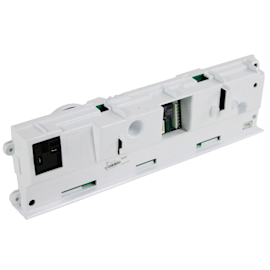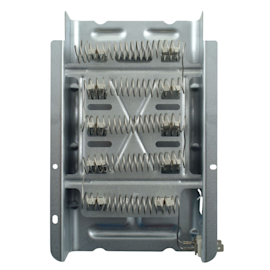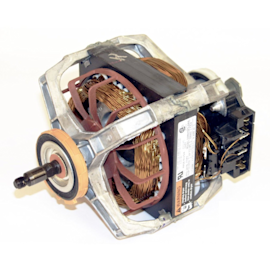- Kenmore refrigerator water filters
- Whirlpool refrigerator water filters
- Samsung refrigerator water filters
- GE refrigerator water filters
- LG refrigerator water filters
- Frigidaire refrigerator water filters
- KitchenAid refrigerator water filters
- Maytag refrigerator water filters
- Kenmore Elite refrigerator water filters
- Estate refrigerator water filters
- GE Profile refrigerator water filters
- Amana refrigerator water filters
- Bosch refrigerator water filters
- Dacor refrigerator water filters
- Electrolux refrigerator water filters
How does a ventless heat pump dryer work?


A ventless heat pump dryer uses a compressor and refrigerant to heat and dehumidify the air circulating through the dryer to dry the clothes. The ventless dryer also has a small heating element that helps heat the clothes as needed to remove moisture from the load.
Here’s how the process works:
The compressor compresses the refrigerant. The refrigerant heats up during the compression process.
The hot refrigerant goes through the condenser heat exchanger.
A circulation fan moves air through the condenser heat exchanger and into the dryer drum that’s spinning to tumble the clothes. An electric heating element helps heat the air as needed.
The warm air that enters the drum from the condenser heat exchanger circulates through the tumbling clothes and absorbs moisture.
The cooled down refrigerant goes through an orifice to lower its pressure and enters the evaporator.
The warm moist air from the drum exhausts through the evaporator. The evaporator cools and removes moisture from the exhaust air.
The moisture extracted from the exhaust air collects on the evaporator and drips down into a collection tray. When the tray fills up, a drain pump moves the water to the washer or laundry room drain.
The refrigerant returns to the compressor and the exhaust air circulates back through the condenser heat exchanger and the process repeats until the clothes get dry.
Advantages of using a ventless heat pump dryer
You’ll see lower energy bills when using a ventless heat pump dryer. The drying process typically uses less than half the energy that a conventional dryer uses to dry clothes.
A ventless dryer works great in homes or condos where dryer venting is difficult or impossible.
You won’t have to worry about cleaning the exhaust vent duct system that goes to the outside of your home when you have a ventless dryer.
This drying process in a ventless heat pump dryer uses lower temperatures so it’s gentler on fabrics. Less wear and tear on your garments during the drying process helps clothes last longer.
Challenges of having a ventless heat pump dryer
Owning a ventless heat pump dryer doesn’t come without some challenges.
Drying times typically run longer in a ventless heat pump dryer because of lower drying temperatures and recycling of exhaust air. The dryer basically dehumidifies your clothes to dry them.
Some ventless heat pump dryers collect water in a tank that you’ll need to empty instead of having the dryer pump the collected water into the laundry room or washer drain.
You’ll typically pay more for a ventless heat pump dryer than a traditional dryer.
Repairs on ventless heat pump dryers are complicated. A technician certified to work on sealed refrigerant systems is sometimes needed to fix problems in the dryer.
Rebate available for replacing a gas dryer with a ventless heat pump dryer
The 2022 Inflation Reduction Act will provide a rebate up to $840 for replacing a gas dryer with a heat pump dryer. This rebate will be administered by individual states. Details of the rebate or still emerging. See our New Homer Energy Rebates Provided by the Inflation Reduction Act of 2022 article for more information about upcoming rebates. Bookmark that page and check that article for updates on heat pump dryer rebates for 2023.
Installing a ventless heat pump dryer may be the right move for you and your family next time you need to replace your dryer. Carefully weigh the advantages and disadvantages outlined in this article and make the decision that right for your family.
Most common symptoms to help you fix your dryers
Choose a symptom to see related dryer repairs.
Main causes: bad gas valve coils, broken heating element, tripped safety thermostat or fuse, bad operating thermostat, c…
Main causes: bad drum support roller, damaged idler pulley, broken blower fan blade, worn drum glide bearing, bad drive …
Main causes: damaged door strike, worn door catch…
Main causes: clogged exhaust vent, bad motor relay, loose dryer door catch, bad door switch, control system failure, fau…
Main causes: door switch failure, lack of power, broken belt, blown thermal fuse, bad drive motor, control system failur…
Main causes: clogged exhaust system, heating system failure, deposits on moisture sensor, control system failure…
Main causes: bad timer or electronic control board, door switch failure…
Main causes: lack of electrical power, bad power cord, wiring failure, bad control board, blown thermal fuse, bad door s…
Most common repair guides to help fix your dryers
These step-by-step repair guides will help you safely fix what’s broken on your dryer.

How to replace an electronic control board in an electric dryer
The electronic control board manages the components and controls the cycle times in your electric dryer. Follow these st…
Repair difficulty
Time required
45 minutes or less

How to replace a heating element in an electric dryer
The heating element in an electric dryer generates the dryer's heat—it's one of the first things to check if the air in …
Repair difficulty
Time required
15 minutes or less

How to replace a dryer drive motor
A defective drive motor struggles to rotate the drum or might not turn the drum at all. Follow the steps in this dryer r…
Repair difficulty
Time required
90 minutes or less
Effective articles & videos to help repair your dryers
Use the advice and tips in these articles and videos to get the most out of your dryer.

Get expert tips on using your dryer efficiently to save energy.…

Learn about all the convenient features on our Sears PartsDirect website that make your parts purchases easier.…

Get answers to frequently asked questions about Sears and Sears PartsDirect.…